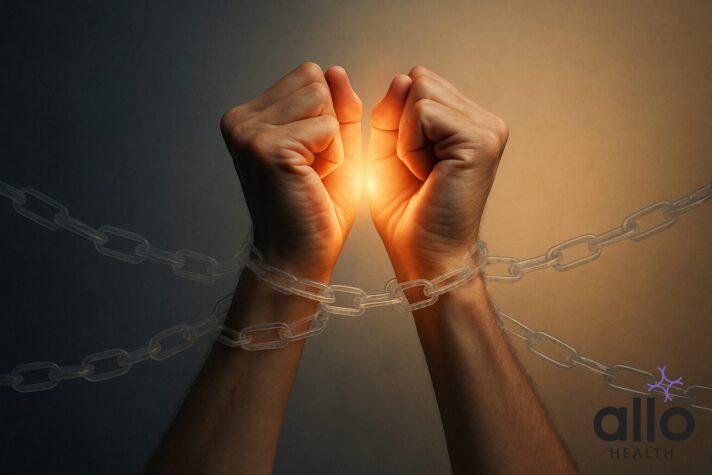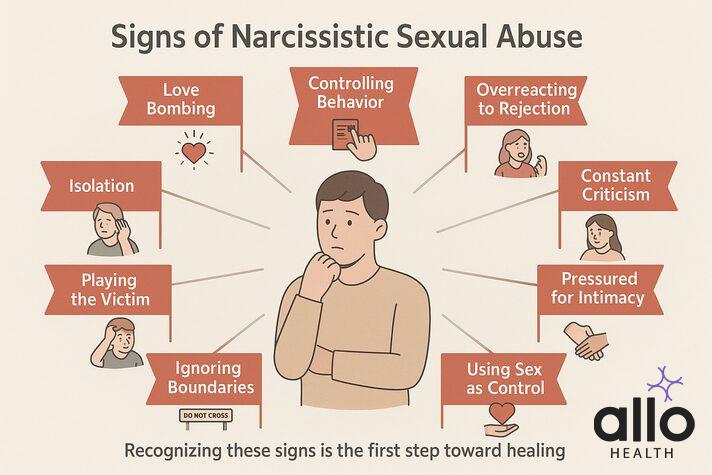Narcissistic Sexual Abuse: What to Know

Narcissistic sexual abuse is a form of emotional and psychological manipulation where intimacy is used as a tool for control, rather than connection. This article helps you recognize subtle but harmful behaviors—like coercion, boundary violations, and gaslighting—that may not leave physical scars but deeply affect self-worth, trust, and emotional well-being. Whether you’re seeking understanding, validation, or healing, know that even one red flag is enough to take seriously. You’re not alone, and support is available. Healing begins with acknowledging your experience and trusting your inner voice.
If you’ve found yourself Googling this, chances are you’re looking for clarity.
Maybe you’re in a relationship that is making you feel confused, unseen, unheard, deeply used, or emotionally drained — especially around intimacy. You might be wondering: “Is this normal? Or am I being manipulated?” If this sounds familiar, you’re not alone. Many survivors of narcissistic sexual abuse walk away confused — not because it didn’t happen, but because it didn’t look like the kind of abuse we’re usually taught to recognize. If something feels off, trust that feeling—it isn’t just in your head.
In this article, we’ll break down what narcissistic sexual abuse actually is — in simple terms. We’ll walk you through the signs, explain how it affects your emotional and sexual well-being, and guide you on what healing can look like. Let’s start at the beginning.
What is Narcissistic Sexual Abuse?
Narcissistic sexual abuse happens when someone with narcissistic traits or a narcissistic personality uses sex as a tool — to control, manipulate, or exploit their partner.
This isn’t just about rough relationships or mismatched desires. It’s about crossing sexual boundaries repeatedly
It’s important to know: this is a form of emotional and psychological abuse. It may not always leave physical scars, but the emotional ones can run deep.
Signs of Sexual Abuse by a Narcissist

Identifying narcissistic sexual abuse can be difficult, especially when manipulation is involved. Remember: you deserve a relationship that feels safe, respectful, and genuinely supportive. Below are some common signs to start with:
- Love Bombing: You know that feeling when things move way too fast—like someone’s already talking about forever after just a few dates? That’s love bombing. It’s when someone showers you with excessive affection, big gestures, and nonstop compliments early in a relationship to quickly gain your trust and attachment before you’ve even had time to think. It might feel like a romantic fairytale at first, but it can be a sign for control or manipulation down the line.[1] [2]
- Controlling Behavior: This can show up subtly—like telling you how to dress, who to hang out with, or making decisions for you. Over time, it can really chip away at your freedom.[3]
- Overreacting to Rejection: Everyone hears “no” sometimes. But if they get angry, moody, or manipulative just because you turned down an advance, it’s not your fault—it’s their issue.[4]
- Constant Criticism: They make you feel ashamed of your body or needs: If they criticized your appearance, laughed at your desires, compared you with others, or made you feel “too much” or “not enough,” — it adds up to emotional abuse. They even turn sex into a performance test, like your worth depended on how “good” you were in bed. Instead of intimacy feeling safe, it feels like an exam you could fail. Due to this you’re constantly second-guessing yourself because of their words.[2]
- Plant Insecurity: They might keep bringing up their ex, or talk about how attractive someone else is, or dropping hints like “others would treat me better”. That’s not just rude—it’s a tactic. Narcissistic people do this to mess with your head, making you feel like you’re not enough so you start chasing their approval. It’s all about control. The more insecure you feel, the easier it is for them to keep you wrapped up in doubt and dependency. And over time, that seriously chips away at your confidence.[5]
- Pressured for Intimacy: Physical closeness should always be mutual. Maybe you gave in just to avoid conflict. Maybe they made you feel guilty, like you were a “bad partner” for saying no. If sex feels like an obligation — not a choice — that’s a huge red sign. Consent isn’t just about saying yes. It’s about wanting to say yes. If you felt coerced, guilted, or afraid to say no — that’s not real consent.[6]
- Ignoring Boundaries: Maybe you said “I’m not comfortable with that,” and they did it anyway completely ignoring your “NO”.[7] Or they laughed it off and made you feel silly for even having boundaries. That’s not love — it’s manipulation.
- Playing the victim: Ever tried talking to them about something that hurt you, and somehow you end up apologizing? That’s blame shifting. They flip the script so you feel like the one at fault—even when you’re not. It’s not normal to walk away from these conversations feeling more confused.[5] [2]
- Isolation: One of the more painful tactics narcissistic abusers use is slowly cutting you off from your support system. They might make you feel guilty for seeing friends, plant doubts about your loved ones, or say things like, “I’m the only one who really understands you.” Over time, you start feeling more alone — and more dependent on the abuser.[5]
- Use sex to control you: They might withhold sex to punish you or use it to pull you back in after an argument. This kind of push-pull dynamic is emotionally destabilizing and deeply harmful.[8]
You don’t need to have all these signs for your experience to be valid. Even one is enough to seek support and start healing.
“Your discomfort is valid. If your body or instincts are telling you something is off, listen to them — even if no one else sees it. The body often recognizes abuse before the mind is ready to name it.”
Effects of Narcissistic Sexual Abuse
Many survivors say something really heartbreaking — they felt like their body was used, but they as a person were completely invisible. That sense of emotional invisibility is deeply damaging. Over time, it can lead to:
- Emotional confusion: One minute you feel loved, the next you’re discarded. That rollercoaster can leave you questioning your reality.[5]
- Low self-esteem: When someone constantly puts you down, it’s hard not to internalize it. You start feeling like you’re not enough—or like you’re somehow broken.[5]
- Anxiety and depression: The constant emotional chaos and uncertainty can take a serious toll on your mental health.[2]
- PTSD (Post-Traumatic Stress Disorder): For some, the trauma doesn’t just fade. After abuse, some survivors experience PTSD — where the trauma keeps showing up through flashbacks, nightmares, or feeling stuck in past moments which can become part of daily life.[2]

- Difficulty trusting others: When someone you trusted betrays you deeply, it makes opening up again feel terrifying.[9]
- Dissociation: After the relationship ended, you felt emotionally numb or violated: This kind of delayed realization is common. Many survivors only begin to process what really happened once the relationship is over. Sometimes, your brain just disconnects from its own emotions and experiences—it’s a coping mechanism to survive the trauma making you feel numb. For many, this also affects libido—there’s no desire, just a sense of being sexually shut down.[10]
- Body image struggles: Being objectified or criticized repeatedly can leave you feeling ashamed of your own body.[10]
- Physical symptoms: Things like insomnia, headaches, stomach issues, or changes in appetite are more common than you’d think—our bodies carry trauma too.[2]
- Struggles with decision-making: After being manipulated or gaslit for so long, even simple choices can feel overwhelming. You stop trusting your own instincts: You may have felt like something was off… but convinced yourself it wasn’t “bad enough” to count as abuse.[9]
- Constantly feeling like it’s your fault: One of the most damaging effects of narcissistic abuse is this deep belief that you were the problem all along. A lot of survivors blame themselves, even when it was never their fault. That shame can slow down healing in such painful ways.[2]
- You are scared to say “no”: Whether the fear is physical, emotional, or just the dread of how they’d react — if you didn’t feel safe setting limits.[9]
If any of this sounds familiar, please know you’re not alone—and none of it is your fault. Healing is possible, and you deserve support, understanding, and a space where your voice matters.

24x7 AI backed chatbot for all your sexual health related queries

How to Start Healing
If you’ve been through narcissistic sexual abuse, just reading this may feel heavy or even scary. But you’re here — and that’s a powerful first step. Healing doesn’t follow a straight path. You might have good days and bad ones. That’s okay. What matters is that you’re making space for your emotions and moving forward — even if it’s just one small step at a time.
Here are a few gentle steps that can help you begin your healing journey.
- Acknowledge what happened: Healing isn’t about forgetting what happened. It’s about understanding it, validating your experience, and slowly rebuilding your relationship with yourself.[11]
- Set and Maintain Boundaries: Even if you’re still in contact. This might mean reducing communication or cutting ties entirely.[5]

- Engage in Self-Care:
- Movement that feels safe: meditation, gentle yoga, stretching, dancing in your room. This will help reduce anxiety, regain emotional stability, and rebuild trust in yourself.[11]
- Journaling: Writing helps untangle your emotions. Even if you don’t know what to say, start with what hurts. Let the truth flow — without judgment.
- Support Groups & Survivor Communities:
- There’s something powerful about sitting with people who say, “I’ve been there too”. Support groups — online or in person can give you: a sense of belonging and validation, stories that remind you you’re not “too sensitive” or “crazy”, space to speak freely, without judgment or confusion. Try:[11]
- Online forums
- Local meetups for abuse survivors
- Facebook groups or nonprofit-led Zoom circles
- There’s something powerful about sitting with people who say, “I’ve been there too”. Support groups — online or in person can give you: a sense of belonging and validation, stories that remind you you’re not “too sensitive” or “crazy”, space to speak freely, without judgment or confusion. Try:[11]
Even if you’re not ready to speak, just listening can be healing.

- Therapy: A Safe Space to Start Untangling Everything
If you’ve gone through narcissistic sexual abuse, your world can start to feel really small. The aftermath can make your mind feel like a cluttered, chaotic place — especially when narcissists tend to isolate their partners from friends, family, and anyone who might validate their experience. That kind of loneliness can make you question your own reality. That’s why one of the most important first steps is to simply talk to someone — a safe, neutral person who can gently help you unpack what’s happened, without judgment.
Therapy isn’t about “fixing” you — because you’re not broken. It’s about validating your experience, helping you understand what you went through, and guiding you as you find your way back to yourself.
We know it’s not always easy to reach out. The idea of opening up can feel scary or overwhelming. But you don’t need to have it all figured out to begin. Just showing up is enough. Therapy gives you a space to feel seen, heard, and slowly start healing — at your own pace.
You don’t have to do this alone. And honestly? You shouldn’t have to. Healing gets easier when someone’s walking with you.[12]
Understanding and addressing narcissistic sexual abuse is essential for the well-being of victims and the prevention of further harm. If you or someone you know is experiencing such abuse, reaching out for professional help is a critical step toward recovery.
The following blog article provides general information and insights on various topics. However, it is important to note that the information presented is not intended as professional advice in any specific field or area. The content of this blog is for general educational and informational purposes only.
Book consultation
The content should not be interpreted as endorsement, recommendation, or guarantee of any product, service, or information mentioned. Readers are solely responsible for the decisions and actions they take based on the information provided in this blog. It is essential to exercise individual judgment, critical thinking, and personal responsibility when applying or implementing any information or suggestions discussed in the blog.



